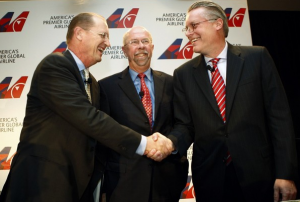As most industries mature, and certainly the airline industry has been around a long time, consolidation ensues. But that's not the case with airlines. Instead, each year the industry becomes more fragmented. Anyone with a few million and the necessary paperwork can start an airline. And so they do.
Imagine if there were 30 steel companies in the US.
What is it about consolidation that airlines hate so much? Why do entrepreneurs launch new airlines when most start ups are doomed to fail and the industry is not profitable?
Almost any economist will tell you that the world has too many airlines chasing (especially now) too little traffic. Every little podunk country has its own flag carrier, even if it makes no economic sense. Every year it seems, there's a new SkyBus or Independence Air, Zoom, EOS, MaxJet, or Express Jet, and every year, there's one (or more) fewer, lost not to consolidation but to liquidation.
You'd think, with the cost of jet fuel and fewer passengers, that airlines all over the world would be jumping at the chance to combine. Of course, some are: Delta and Northwest should be united by the end of the year, and overseas, we've seen British Airways, Lufthansa, and Air France buy other large and small carriers.
Truth is, consolidation isn't as easy as it might appear. First, there are government regulations. In order for two US legacy airlines to combine, the US government is going to first make sure that the new carrier doesn't have an overwhelming market share. So American cannot combine with, say, United because the combined entity would have over 30 percent of US market share and that would be very anti-competitive. As a result, some experts say, it's possible that we might see a smaller legacy carrier, such as US Air, intentionally shrink in size in order to combine with a larger airline. But shrinking, and remaining in business, is a tricky business.
Plus, the US has laws preventing a foreign carrier, such as British Airways, from owning more than 25% of a US carrier.
Then there are labor issues, mainly pilot seniority. Pilots are loathe to give up the pay and perks associated with seniority and if one airline merges with another, a captain at one airline might become a first officer at the combined carrier. Pilots hate that sort of thing.
And then there's the mystique issue. "Airlines are such a sexy business investors can't resist it," writes Victor J. Cook of Tulane's A.B. Freeman School of Business in a June 2008 paper. Every country wants its own. Guys just like to run airlines. Even Donald Trump got in the game when Eastern went belly up back in the late eighties.
And now that oil prices have come down, there's less urge to merge.
Even so, during a panel discussion at the recent ACI-NA (Airports Council International North America) annual convention in Boston, most experts opined that further consolidation is both inevitable and desirable, and rules prohibiting foreign ownership of US airlines should be revisited.






